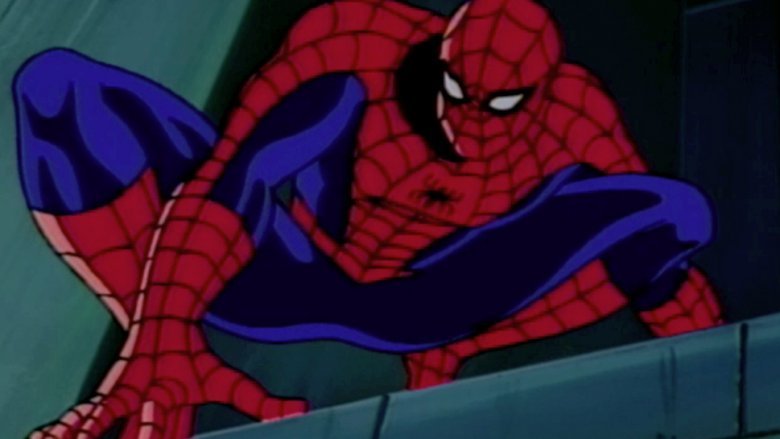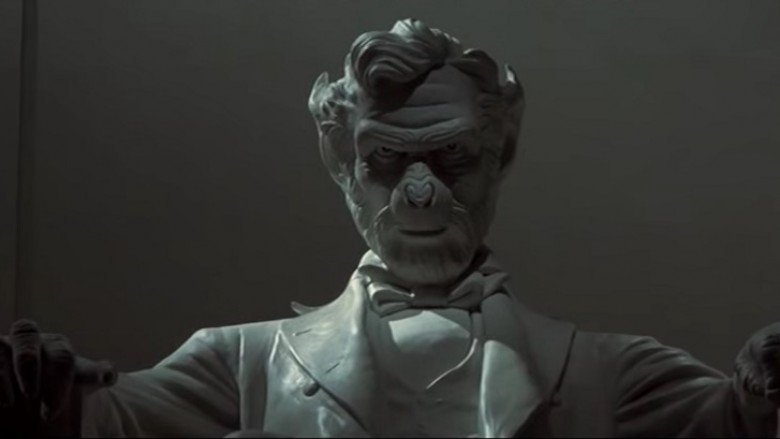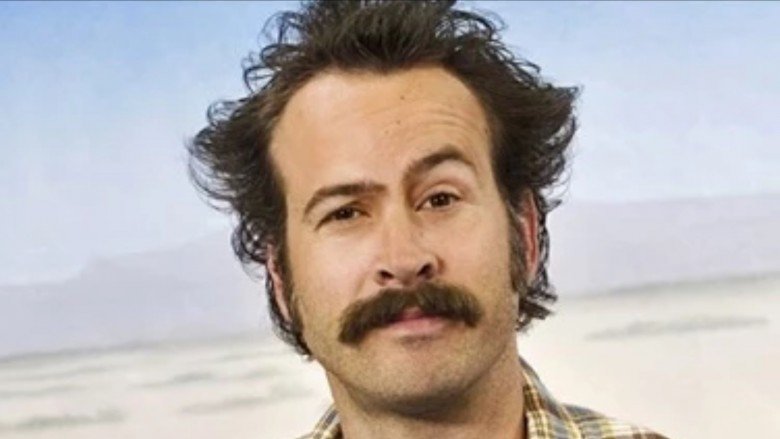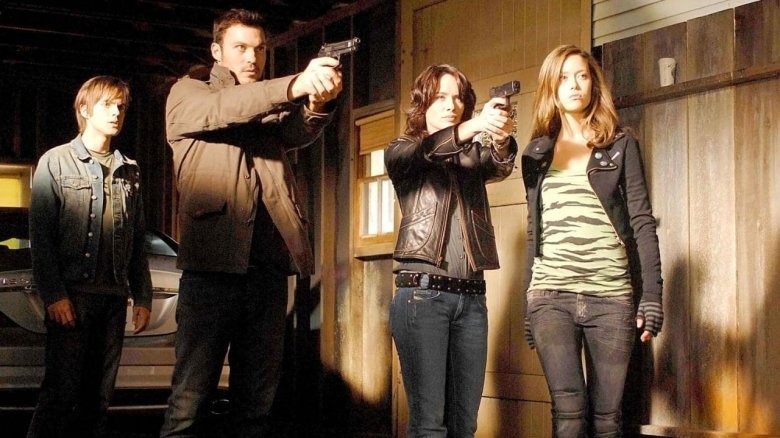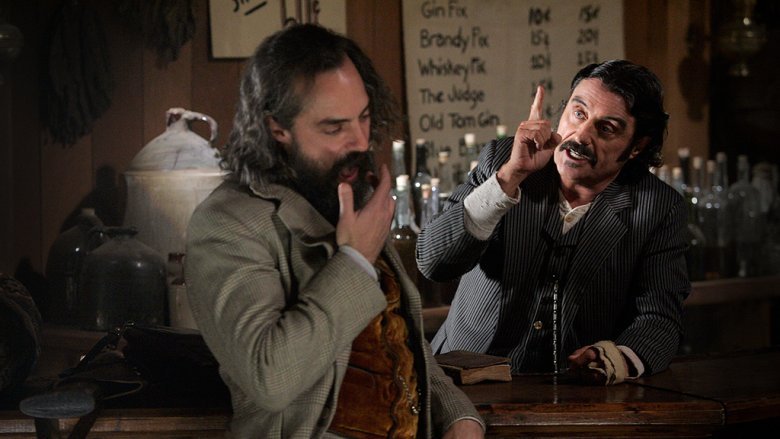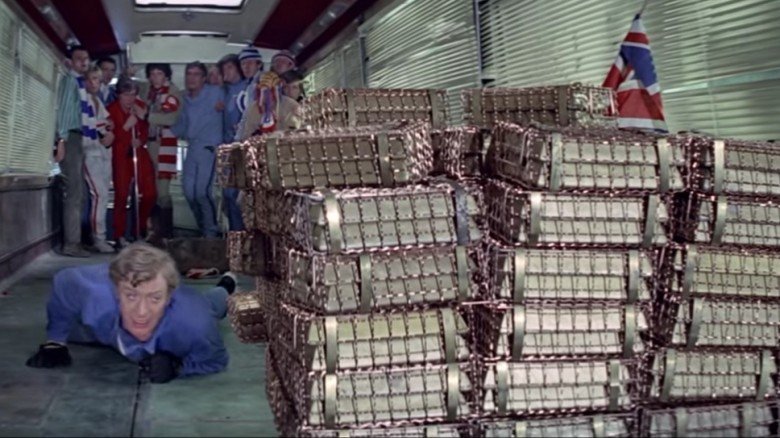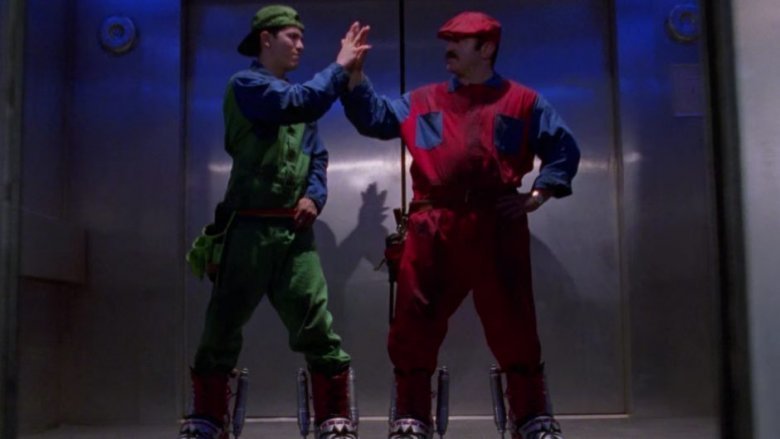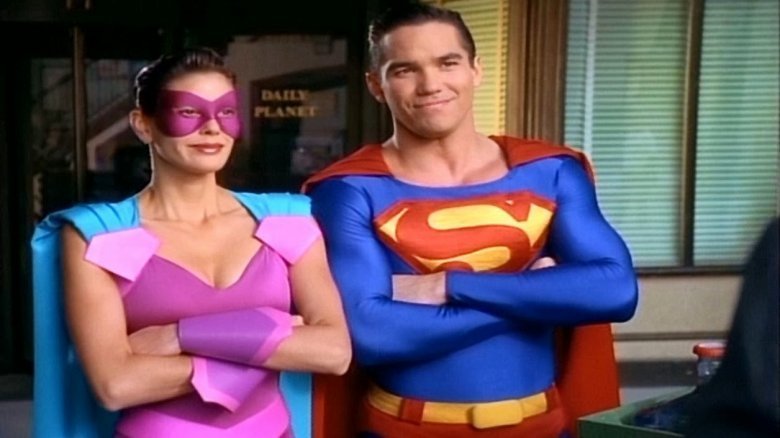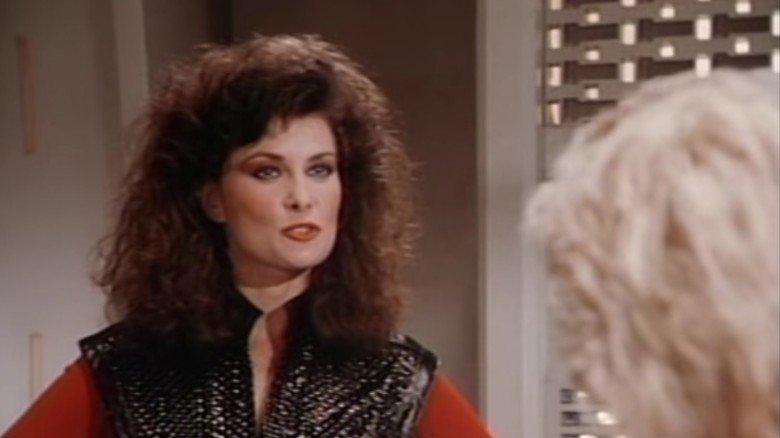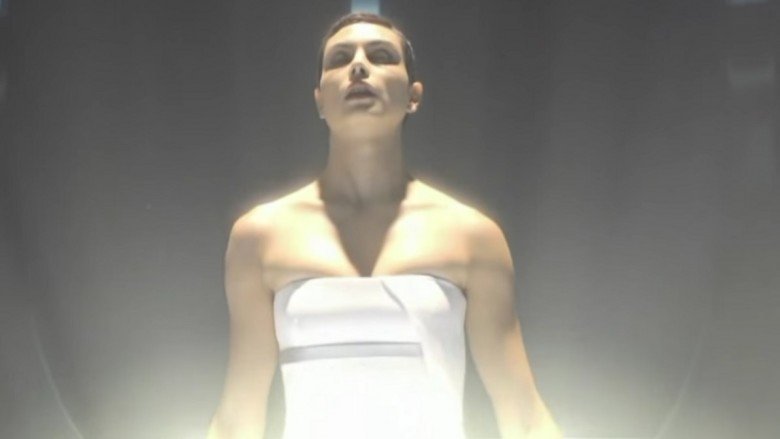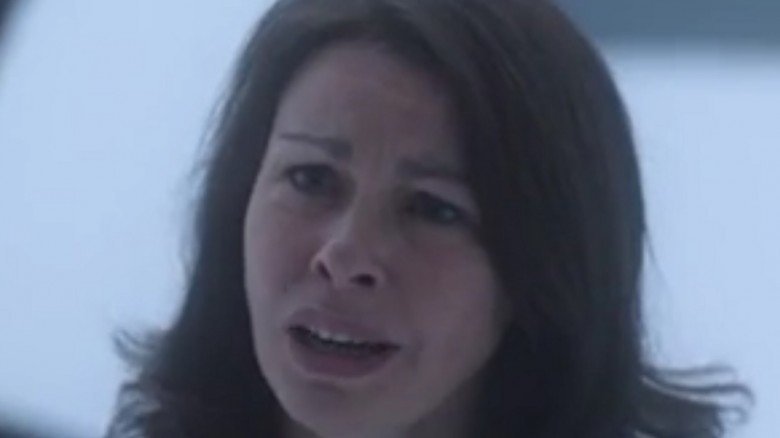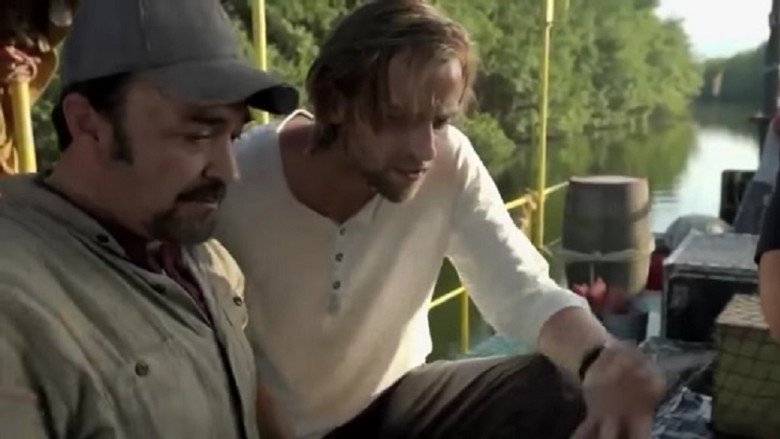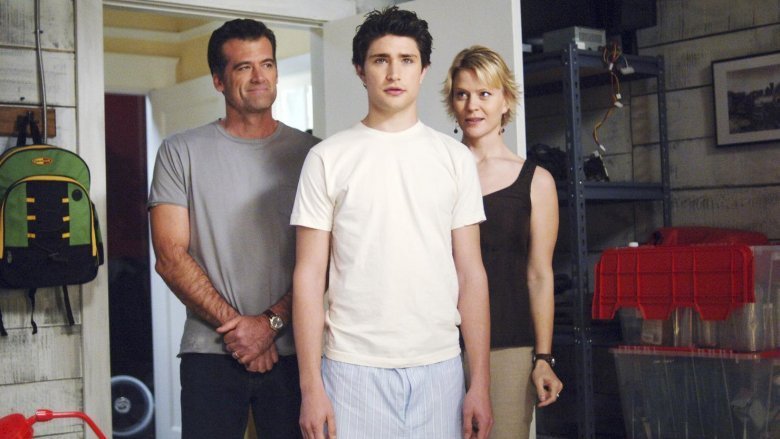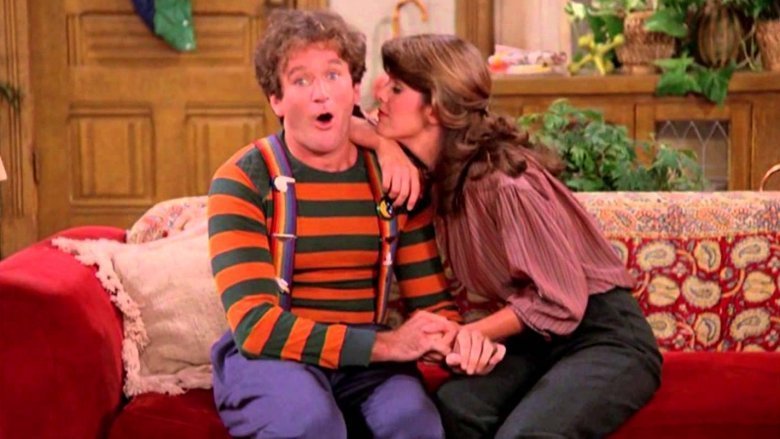Cliffhangers That Never Got Resolved
The cliffhanger is one of the most important weapons a writer can have in their arsenal. When done right, they leave the audience breathless, dying to see what happens next. Sadly, there are also many cliffhanger attempts that never get resolved, leaving fans hanging forever and never rewarding their patience and loyalty with, well, anything.
'Spider-Man: The Animated Series'
While everyone enjoys the might of Marvel Studios today, in the '90s, Marvel Comics faced far darker times, and even potential bankruptcy. One of the few bright spots was Spider-Man: The Animated Series, starring NYC's favorite web-slinger (along with just about every Marvel character you could ever hope to cosplay as). After four years, Peter Parker marries his beloved Mary-Jane, only to discover she's actually a clone, and the real MJ had been thrown off a bridge into an inter-dimensional portal by Green Goblin. Marriage is hard.
Spidey rushes off to save his wife (who he never really married, because Goblin) but we never find out what happens. The series ended up an unfortunate victim of Marvel's then-tumultuous business dealings. Seeking to make cash, the series was licensed to Fox to help Marvel sell their toy line. Marvel's Ari Avad ended up at odds with Fox Kids' Margaret Loesh, who ordered the series canceled to get at Avad. So as it turns out, Spidey's greatest nemesis wasn't J. Jonah Jameson, but disgruntled, dueling TV execs.
Plans for Spidey to find MJ in colonial England were shelved, and series writer John Semper Jr. later apologized for traumatizing viewers with the finale, realizing that the implication MJ was never rescued wasn't actual, proper closure. As for Marvel, it was rescued from doom and morphed into a powerhouse, Disney-owned uber-studio. Many Spidey-fans still celebrate the series, despite realizing that Marvel's got Avengers tunnel vision, and will never turn back the clock to save Cartoon Spidey's fair, red-haired maiden.
'Planet of The Apes' (2001)
The monkey vs. man war rages on in new feature films, but less celebrated is Tim Burton's 2001 The Planet of the Apes, where Mark Wahlberg crash-lands on a planet populated by intelligent apes, after he travels through a time portal attempting to rescue a space pod piloted by his chimpanzee. A man's love for his monkey knows no bounds, as any viewer of BJ and The Bear can tell you.
In the end, Wahlberg, pursued by Tim Roth's villainous General Thade, goes back through time and returns to the present via his chimp's pod, landing in Washington, DC. To his shock, he discovers that what was once the Lincoln Memorial is now dedicated to Thade. This means ... well, we never really find out, as the Ape Police (who, sadly, never got their own spinoff film) arrive, and that's it for the film. So, what happened? Did Thade find a way to go farther back in time than Wahlberg, effectively beating Davidson home, changing history into a timeline more beneficial for those who love bananas? We don't know, because nobody ever told us.
There probably could've been a sequel, but Burton, when asked about helming one, remarked he would sooner leap out of a window. Most aggravatingly, he was apparently handed a script and, when he told Fox how much it would cost to film, they acted like he was a "crazy, overspending, crazy person." When the director chooses an uncontrolled jump to concrete waiting below over dealing with a studio again for a sequel, that's probably not a good sign. As far as Fox goes, despite earning over $360 million at the box office, they chose to forget the film ever happened, instead waiting a decade to reboot the franchise. That effort did much better and was probably for the best, unless you were Mark Wahlberg or his poor chimpanzee.
'My Name Is Earl'
You probably know a lot about My Name is Earl — it was quite the successful show. But if you had stuck around to the end, you'll know Jason Lee never completed everything on his list of do-gooding, karma-building tasks. See, after four seasons of wacky adventures, we got a literal "To Be Continued" graphic, promising to reveal the parentage of Earl Jr., who was obviously not Earl's. Problem is, with costs rising for a fifth season, NBC opted to cut bait. Series creator Greg Garcia snarked, "It's hard to be upset about being thrown off the Titanic" in response. That's one of saying many viewers had not stuck around to the end.
TBS sought to pick up the series, but finances were the one thing Earl couldn't cross off his list. Depending on who's telling the story, either TBS or Garcia cut off discussions, for fear of what it would cost to mount Season Five. Yep, despite winning the lottery, losing his ticket, and then finding it again, it was ultimately cold hard cash that led to Earl never getting to complete his list. Garcia would go on to make Earl references aplenty on follow-up series Raising Hope (even having one character kick a NBC exec in the groin for canceling Earl) but poor Lee is trapped forever in syndication purgatory, his heroic journey left unresolved.
'Terminator: The Sarah Connor Chronicles'
When you make a show about time travel like Terminator: The Sarah Connor Chronicles, you need to have your ducks in a row. Instead, the show ended on a cliffhanger that completely wiped out the entire Terminator storyline. In the finale, John Connor gets sent to the future, meaning he didn't do his job (stop Judgment Day) in the present. Ergo, nobody in the future had ever heard of him, and that's how the series ended: the once-savior of humanity reduced to anonymity, eliminating any reason for Arnold Schwarzenegger to stalk him in the first place.
Rather than give Sarah a chance to fix this time paradox, Fox canceled the show outright. According to Syfy, Fox felt the show had become too expensive. Plus (believe it or not) the executives thought the story was all done, creatively speaking. These bigwigs must be the kind of people who read books up until the final chapter and then just quit. As for what could've been, we have no idea. The website Cliqueclack asked series creator John Friedman to explain how he would've ended the show, and he flat-out refused. As he explained on Twitter, he never wants to tell because "every show is a dialogue between creator & viewer. Every time creator says what s/he would do w/o an episode to show it, it's a monologue." Sounds like we're stuck with the ending we got. So yeah, it all just never happened.
'28 Weeks Later'
28 Days Later begat 28 Weeks Later, which ended on a cliffhanger that foretold what would almost certainly be 28 Months Later. At the very end of Weeks, survivors fleeing London get chased out of their helicopter by ravenous zombies, and as the furiously chaotic shaky cam settles down, you see the Eiffel Tower in the background. The plague has spread to Paris and will probably soon encompass the rest of France and all of Europe. Sadly, to date, nobody's followed up on this massive plot thickening at all.
Part of the issue is that Alex Garland, who wrote Days but not Weeks, typically abhors sequels and has no real interest in returning to his zombie world. In addition, as he explained in a 2010 interview with Worst Previews, the rights to Days (and presumably, the franchise) were "frozen between a group of people who are no longer talking to each other." In a 2015 interview with IndieWire, Garland elaborated that "group" was himself, Fox, director Danny Boyle, and producer Andrew McDonald, but also said that he had an idea for Months that he effectively gave to Boyle and McDonald, who will likely take Garland's ideas and build an entire film around them. Maybe. There's no word on when or if Months will ever grace theaters, but let's hope it's soon. That way, Fox can get around to finishing the rest of the saga. 28 Centuries Later, anyone? Millennia? Epochs? Eternities? Sequels forever.
'Hannibal'
Hannibal Lecter is the rare cannibal we'd quite like to stick around forever. Unfortunately, that's currently not happening, as NBC pulled the plug on Hannibal in 2015 after three seasons. Deadline reported the cause as low ratings (Hannibal had a heavy cult following, but a weak heartbeat isn't enough to keep a show on life support these days). Unfortunately, this axing happened before the series' storyline wrapped up, leaving us with a final image of Will Graham, the detective obsessed with bringing Lecter down, killing a man, deciding he loves it, embracing Hannibal, and sending the two plummeting over a cliff to their apparent deaths. Apparent because the camera pans down the cliff to show rocks, crashing waves ... and no visible bodies. It's the Sherlock Holmes/Moriarty ending: did they survive? Did they die? Will NBC ever throw us a bone and let us find out?
Probably not, which is why Hannibal showrunner Bryan Fuller is hoping to shop the show to other networks. As he told Collider, "The cast is game, I'm game, it's just a matter of finding the right time where everybody's schedules sync up." Amazon owned the streaming rights until August 2017, and it clearly wasn't interested in new episodes. (They would've been ordered.) In 2016, Fuller said he hoped to pitch elsewhere after Amazon was out of the picture so he could give us all closure on what happened to Will and Hannibal. Cannibal drama on Netflix or HBO? Yes, please.
'Amazing Spider-Man 2'
One Spider-Man had to die so another might live. In this case, Andrew Garfield's Amazing Spider-Man franchise skidded to a stop midstream, and in its place we got Tom Holland's take on the Wall Crawler in Homecoming. That's certainly not a bad thing, but it does make you wonder what could've been.
The last thing we saw in Amazing Spider-Man 2 was the introduction of Rhino, him terrorizing New York City, Spidey leaping into battle to fight him, and the screen cutting to black. According to Hollywood Reporter, the plan was for ASM3 and ASM4 to continue the story. In fact, according to Deadline, the plan was for Sony to build an entire cinematic universe around everyone's favorite Garfield (cats and presidents excluded) — there would have been Spidey films, Sinister Six films, and Venom films. Unfortunately, ASM2 underperformed and Sony sought out a deal with Marvel to take Spidey in a new direction. This deal — which involves confusing rights and money issues best summarized with "Spidey hangs out with Iron Man now, so hooray" — placed the hero smack-dab in the Marvel Cinematic Universe, sent him back to high school, and canceled out any need for Garfield's Amazing-verse. Some of the spinoffs, such as Venom, may happen yet, but they'll have nothing to do with Marvel's Spidey. What happened to Sony's Spidey post-Rhino will forever remain a mystery.
'Deadwood'
Update: Boy, HBO sure did go and make an entire movie about Deadwood just to get themselves taken off lists like this one, didn't they?
Deadwood, the exquisitely vulgar and violent HBO Western, ended on both a nonviolent and ambiguous note, which likely satisfied very few of its fans. Basically, the long-awaited showdown between baron George Hearst and the town of Deadwood wound up not being a showdown — Hearst just backed down and left, but not before forcing Al Swearengen (who still owns the most appropriate character name ever) to kill a woman at his request. Last we see, Swearengen is scrubbing her blood off the floor, attempting to cover up his crime. What was the fallout? Would he answer for his crimes? Would Hearst? Would anyone? We don't know, because HBO wouldn't let us know.
While ratings for Deadwood were fine, the price tag was not. As TVSeriesFinale reported, HBO got nervous because Deadwood's creator, David Milch, started work on another HBO series, John from Cincinnati, and HBO worried he wouldn't be able to commit to Deadwood for a while. They didn't want to keep paying actors' salaries if they weren't acting, so they waved bye-bye to the beautiful, safe hamlet of Deadwood. The hope is that, one day, we'll get a movie to wrap things up. As SlashFilm reports, that supposed movie has been bandied about for some time now. Sometimes it's going to happen, other times it's not, but Swearengen vessel Ian McShane is down to do it, and we're all down to see it.
'The Italian Job' (1969)
In 1969's The Italian Job, the dream team of Michael Caine, Noel Coward and Benny Hill team up to steal $4 million worth of gold, angering the Italian mob and authorities alike as they make off like bandits after some great car chase scenes. In a complete last-second twist, the bus they use to camouflage their escape skids off a mountain road, and teeters off a cliff. Efforts to reach the loot fail as Caine slowly crawls for the gold, helpless as it slides away. Thinking for a moment, Caine declares, "Lads, I have a great idea," but whatever this plan was, the idea is never revealed. Instead the film ends.
Obviously, the idea was to film a sequel. Director Peter Collinson had ideas on how to rescue the crew and run afoul of the French Mafia. So, why didn't it happen? Two words: Michael Caine. He refused to do publicity for the film in the United States because the American poster featured a naked woman beside a gun-toting gangster. Feeling the marketing turned off any potential audience (clearly, he doesn't understand Americans), Caine declined to help the film and helped to sink it Stateside. When it failed to make bank in America, future plans were scuttled and it was all left to oblivion.
Oddly enough, neither the poster nor the plot to Jaws: The Revenge gave Caine any pause. Even odder, The Royal Society of Chemistry would later put out a call, seeking answers as to how the crew might have escaped with the gold intact. Ah, science.
'The Thing' (1982)
John Carpenter's 1982 classic The Thing offered up one of the most ambiguous endings of all time. After an alien monster turns everyone else around into an extension of itself, we're left with two people stuck in a snowstorm: Kurt Russell's MacReady and Keith David's Childs. MacReady had just supposedly killed The Thing, but he's not sure if Childs is one last assimilation. Likewise, Childs doesn't know if MacReady is now The Thing. The two exhausted warriors share some drinks while possibly freezing to death, eyeball each other, and then ... credits. We never find out which one is The Thing, if neither one is, or if they simply died before finding out for sure. Over 30 years later, however, we still have no direct sequel, meaning this cliffhanger has become one of those "Lady And The Tiger"-esque, open-to-interpretation endings.
That said, it seems there was once going to be an actual answer in the form of a sequel. According to Coming Attractions, in 2005 the Sci-Fi Channel announced plans for a mini-series titled Return Of The Thing. Based on the write-up presented by Corona, the big reveal would've been that MacReady and Childs froze to death, with neither revealing themselves as The Thing. That may or may not have been the plot they would've filmed, but we'll never know because Sci-Fi shelved the series before starting. Childs and MacReady are still staring each other down to this day.
'Super Mario Bros.'
You think you're optimistic? You've got nothing on the makers of the Super Mario Bros. movie. Despite clearly making one of the dumbest films ever, they actually ended on a cliffhanger. Daisy returns to the brothers, gun in hand, saying she needs their help again. Obviously, a sequel never came to fruition, thanks to the critical and commercial lambasting the original took. (It made $20 million on a $48 million budget, and most critics didn't think it was worth watching.) Since then, we've had to fill the void with awesome Mario video game after awesome Mario video game.
If you truly must know what might have happened in Super Mario Bros. 2, then turn to fan fiction. In 2013, two fans named Steven Applebaum and Ryan Hoss spoke with Parker Bennett, one of the film's writers. They turned what they learned in that conversation into an unofficial sequel comic, which you can read for free. In it, Mario and Luigi encounter a new threat: a monster named Wart ruling from inside an area of Dinohattan called Subcon. Yes, it's Super Mario 2, kind of. Oh, and the comic also ended on a cliffhanger, perhaps the most fitting tribute to the original movie imaginable.
'Lois & Clark: The New Adventures of Superman'
Lois & Clark was a Superman story that focused just as much on Superman's relationship with Lois as the part where he's a superhero and keeps saving the world. The end of Season 4 included a plot twist that fit this love story: Lois and Clark find themselves a baby. Unfortunately, the network executives chose to cancel the series before we could learn anything about the baby — after all, this was to be Superman's adopted kid. No way would he have just grown up to be a normal boy.
According to a Krypton Site interview with Brad Buckner, Lois and Clark's executive producer from Season 3 and 4, that was to most certainly be the case. Though he does admit "it's starting to get a bit fuzzy" in his mind, he seems to recall that the kid would have been Kryptonian royalty. He would have grown at a super-rapid rate (going from infant to pre-teen within months, much like Baby Groot) and would have trouble learning to responsibly use his powers, like many an awkward adolescent. Sadly, this "fuzzy" memory is the closest we're likely to ever get to what could've been.
'V' (1983)
When World War II allegory/alien invasion opus V debuted on NBC as a mini-series in May 1983, it captured the imagination of the United States, with an astounding 40% of the country tuning in. But while creator Kenneth Johnson pushed for the story to continue with a series of two-hour movies, NBC wanted a sequel mini-series, followed by a new, weekly series. So Johnson did what any creative type might: he balked and exited the show.
V moved on without him, but it was never the same. The creeping dread of the original was replaced with one-dimensional characters and recycled stock footage. By the end, complete scenes from earlier episodes were re-purposed — even footage of characters running. What started as smart science fiction, collapsed into a silly soap cartoon centered around what Jane Badler might eat that week. Spoiler: guinea pig lovers, beware
As you might expect, V couldn't be bothered giving the remaining viewers one last satisfactory scene. In the finale, The Visitors agree to peace, but only if human-Visitor hybrid "Starchild" Elizabeth Maxwell returns with their leader to the Visitors' planet. She agrees, breaking her boyfriend Kyle's heart to the point he stows away in the Leader's shuttle. As all of this alien 90210 drama plays out, Diana attempts to overthrow the leader — when foiled, the show makes it clear she's planted a bomb on his ship.
And then ... nothing. NBC just canceled the series, citing the expensive nature of the show, which cost a record breaking $1 million per show. A million for that? Imagine if they actually paid to film new scenes of characters running.
'V' (2009-2011)
When ABC revived V as a brand-new series in 2009, it ignored all that came before. The Visitors, led by their Queen, Anna now promise they "come in peace," only to take over Earth as a human resistance rises against them. Happens. Despite excitement for the revival bringing in fourteen million viewers, V quickly lost steam, leading to the network actually shutting down production at one point to map a new strategy.
By the finale, producers stole the strategy of the original V, killing major characters off with reckless abandon. The Visitors use the Queen's hypnotic bliss powers to take over the entire world with the exception of a few underground — yes, as in literally underground — fighters. More aliens arrive and ... well, thanks for watching. You are now Visitor vittles.
While the Visitors brought amazing technology, the one thing that couldn't provide were ratings power. The audience dissipated after the pilot aired, as viewers gave up on slow plots and the lack of heart that the original '80s mini-series offered. Frustrated, ABC offered the Lizards a second chance, with an abbreviated second season. When ratings stayed cold-blooded, the network felt it was prudent to cut bait fast enough to leave the entire fate of humanity itself up in the air. Cold-blooded reptiles, indeed.
'The Event'
NBC heavily promoted The Event, built around the idea of an impending incident that would change humanity forever, namely aliens invading to rescue their fellow aliens, who have been imprisoned in an Alaskan gulag since crashing there decades ago. All sorts of intergalactic espionage and politics played out over the course of the series — in the end, it is revealed that "The Event" is actually that the aliens create a massive vortex that brings their entire planet into orbit next to Earth. Oh, and the President's wife reveals she's secretly one of the aliens, so Mr. President has an alien baby mama. Who wrote this, Springer?
The series' cancellation was not as much of a shock as the series going away, since the audience had considerably dropped since its big premiere, showing once again that a big marketing blitz will get you on the map, but not in the game. Series creator Nick Wauters promised that "one way or another," they would continue the story but in the end, the series was left without a partner seeking to continue the story. So, The Event actually turned out to be a giant plate of non-closure, with a side order of cancellation.
'Survivors'
BBC's Survivors featured the joyous premise of Earth's population being almost totally wiped out by a super-flu released by an evil corporation. Think The Walking Dead minus zombies, plus British accents, and minus Rick Grimes head tilting. The series ran for two seasons, with our heroes confronting those responsible for murdering much of the humanity in the finale. At the end, Tom, a former convict who found his redemption over the course of the series, stows away on the corporation's plane as they flee — angry, armed and waiting in hiding to exact revenge.
Despite strong reviews, the BBC opted to discontinue the series, citing a decision to try a "broad range of varied and ambitious drama," which was secret code for "not enough viewers." In a strange twist of fate, another illness may have led to a "do not resuscitate" order for the series, as the second season was postponed due to the outbreak of a real life bird flu scare developing across the world. It's not very entertaining to watch the super flu show when people really are dropping dead from an unknown virus.
So, real life health concerns helped wipe out a show about the survivors of a major health disaster. Thanks a bunch, birds!
'The River'
When famous explorer Emmet Cole disappears while seeking the secret of magic in the Amazon, his family decides to take a cruise up the Amazon River and find him in ABC's 2012 found-footage series The River, which had none other than Steven Spielberg and Paranormal Activity creator Orel Peli attached. The series featured angry tribes, cannibalistic zombies, mystical curses and malevolent spirits, but was missing one important thing — the secret of how to bring viewers in and get them to actually watch the series. The premiere had OK ratings, but everything after got sucked into a viewer-less whirlpool.
While we knew something obviously terrible happened to those who left the "documentary" footage recovered from the USS Magus, we don't ever find out exactly what. They rescue Emmet and appear to make their escape from the Amazon, only to stand there slack-jawed and powerless as the spirit of the Amazon, the Boiuna, traps them by shifting the very landscape and river itself, leaving them right back in the middle of nowhere, with no bars on their phones. "Can you hear me now?" No one ever does.
While Netflix toyed with continuing the series, in the end it opted not to go down with the ship. Neither did anyone else, which is why the series ended up sunk after just eight episodes. Dry dock never sounded so good.
'Kyle XY'
Kyle, the titular character of Kyle XY, was on his way to learning who he was, why he had no memories, and why he had no belly-button. Unfortunately, just as his search was getting good in the middle of the third season, ABC Family announced the show wouldn't be renewed. That meant the big season-ending cliffhanger — the realization that Cassidy was Kyle's real father — was the last anyone would ever see of this show. That's like making Empire Strikes Back and refusing to follow it up.
As for why they canceled it? Matt Dallas, who played Kyle, explains in his blog the show fell victim to the biggest art-killer of all: money. As he explains, "Kyle XY's ship was sinking under the weight of its own costs with decreasing viewers to bail it out." The show cost too much and not enough people watched it. It's a cold, strictly businesslike tale as old as time. If you want a general idea of what might have happened, the Season 3 DVD (and YouTube, conveniently) has a 12-minute featurette called "Kyle XY: Future Revealed," where writers and producers talk about what they had planned for Season 4. It's not the same as actually watching a story unfold, but it's better than nothing.
'Mork & Mindy'
Mork & Mindy "ended" in perhaps the most confusing way possible. By Season 4, the show had run its course with the fans, so ABC canceled it. Unfortunately, that season was set to end on an epic cliffhanger, where Mork and Mindy escape a renegade alien, Mork's alien identity becomes public, Mindy's apartment gets destroyed, and the two find themselves traveling through time to escape their enemy. They wind up in the prehistoric era, with seemingly no hope of returning. Since we never got a Season 5, they never did.
According to writer Brian Levant, in an interview with io9, Season 5 apparently had Mork and Mindy traveling through various points in time, meeting historical figures and presumably doing wacky things with them. Levant mentions photoshoots of Mork, Mindy, Benjamin Franklin, and Abraham Lincoln, so clearly they were serious about this, until the big cancel anyway. Adding to the confusion, the show decided not to technically end the series on the cliffhanger, instead running a random "on Earth" episode last, one where Mork tries to earn a promotion from his Supreme Leader. The audience is left to assume they made it back to modern times, solved the villain problem, and fixed Mindy's apartment lickety-split, without telling anyone.
